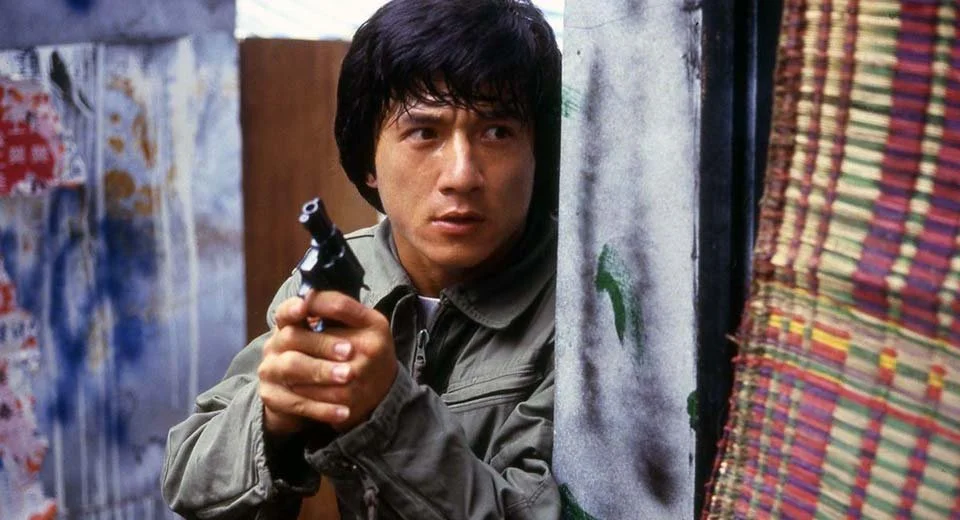#52: Police Story
Release Date: December 14th, 1985
Format: Criterion Collection on Blu-ray
Written by: Jackie Chan and Edward Tang
Directed by: Jackie Chan
4 Stars
Now this is what I call fun. But before the review, a bit of back story on Jackie Chan.
As with most Americans my age, Jackie Chan popped up on my radar in the late ‘90s as the Asian guy from Rush Hour. Those Rush Hour movies are fun in spots (especially the first one), but they really don’t capture the magnetic Jackie Chan persona that he had crafted as a writer/director and star of Hong Kong cinema during the previous two decades. In Rush Hour he essentially plays the straight man (despite his jaw-dropping stunts), and a decent portion of the laughs he generates are from reactions to his Chinese accent. Hilarious to Americans in 1998, I suppose.
But what is the true Jackie Chan on-screen persona? As Jackie Chan describes it, it’s basically the anti-Bruce Lee.
On screen, Bruce Lee is charismatic, confident, serious, philosophical, steady, and handsome. And off screen, he was a truly revolutionary athlete who dedicated his life to the martial arts.
In contrast, Jackie Chan is bumbling, funny, short-sighted (as well as just plain short), lovestruck, and looks like the stunt man, not the movie star. Although trained in multiple disciplines of martial arts, Chan had little interest in portraying them accurately on screen, but rather would choose whichever moves worked best in the blocking of the scene.
It was a shrewd career choice on Chan’s part, in my opinion. Attempting Bruce Lee levels of cool is a tough hill to climb (ask Van Damme or Seagal or dozens of other forgotten ‘80s B-movie martial arts movie stars).
When you watch Police Story you see an absolute movie star, who not only does the most dangerous stunts since Buster Keaton, but is also capable of writing a fun, tight script and helming a large budget, complicated action movie. He’s a true cinema genius in Police Story in my opinion, and I’m not using that term lightly. When you re-evaluate his English language Hollywood films, you see that his gifts are barely being utilized. He’s Michael Jordan shooting free throws. Sure, he can do that if you need him to, but if you’d only let him get into an actual game. Hold on and buckle up.
He’s also, oddly, a throwback to the silent movie era of American film, even though he’s removed from it by half a century and from halfway around the world. Police Story could absolutely have been made as a silent movie, and in my research I found out that Keaton’s The General (1927) and Chaplin’s City Lights (1931) are among his top ten movies of all-time. It doesn’t really surprise me.
Another of his top ten movies? Rocky (1976). Now, I wasn’t going to write about this, but as I was watching Police Story, it did occur to me that there were some striking similarities between Sylvester Stallone and Jackie Chan. Now that I know Jackie Chan loves Rocky, I might as well get into it.
Here are two men that broke into the industry through sheer force of will. They come from challenging childhoods and poverty, who both as teenagers fell in love with an idealized version of reality as portrayed in cinema. They are unconventional leading men, who look ethnic and are initially tied by studios to their perceived ethnic identities. They are both engines of creativity, with sky high ambitions of writing and directing true visionary films. They are groundbreaking in their on-screen physical presences, for Chan his incredible stunt work and fight choreography, and for Stallone his physique and fight choreography as well. They both earn reputations as overachievers, who when directing demand a devotion to the filmmaking process from all of their collaborators, especially actors and stuntmen (Stallone has a tradition of hazing actors in his Rocky movies by pressuring them to take at least one real punch to the chin during filming - Michael B. Jordan has gone on record saying so, and that he was knocked out during the filming of a fight scene in Creed; as for Chan, during the closing credits of Police Story, you can see multiple stunt men being carted off on stretchers from stunts gone awry).
And later, both Chan and Stallone were both slowly eroded by a changing cinema, namely (and ironically) by bigger and slicker action movie franchises. In old age they become, at times, caricatures of themselves. The audience sees them not as the dynamic groundbreakers they were in their early years, but as one-dimensional stars of the past.
But then you stream Police Story - or Rocky - and you’re struck by the largeness of their artistic hearts, when their talent was fresh and their vision was limitless.
